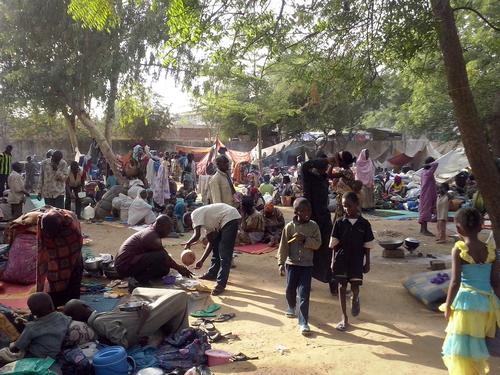For the past two months, more than 15,000 people coming from Bangui in the Central African Republic have arrived by plane in N'Djamena, Chad. More than 100 flights have been organised by the Chadian authorities and by the International Organization for Migration (IOM). The refugees are hosted in social centres and schools. Having fled extreme violence, they are now far from home, without any hope of going back, facing an uncertain future in Chad. In mid-February teams from Médecins Sans Frontières (MSF) began providing medical consultations to newly arrived refugees.
One might walk in front of the building without being able to imagine that hundreds of refugees live behind these walls. Some soldiers control the entrance and exit at the gate. Once you have gone through the gates, there are people everywhere, suitcases, bags. They are mostly women and children, but there are a few young guys and elderly men as well. There are around 500 people living in the Clément centre according to a representative of the Chadian Ministry of Social Affairs. There are several other centres like this one in N'Djamena, the capital city. The same morning, 100 people from CAR were transferred to a camp in Gore, a city in the south of the country. "What are we going to do in Gore?" asks a 18-year-old man, who arrived alone here. "Is there a high school there?"
“My father was killed”
Most of them came by plane from Bangui. "After my father was killed and his shop looted, my mother and my sister wanted to leave with our truck. I didn't want to. Why go to Chad? To do what? CAR is my country, I was born in Bangui like my parents," says Mahmat, 18 years old. He decided to stay in Bangui with his older brother. He then heard that the convoy, in which his mother and sister were traveling, was attacked and he doesn't know if they are still alive. "Later on I managed to go to the market," he says. "On my way back I was told that our neighborhood was being attacked. I met with my older brother and some neighbors gave us a lift in their truck. The two vehicles behind us in the convoy were hit by grenades. They finally reached the airport. It was horrible, everybody was running, I ran too to reach the plane." This is where he was separated from his brother. He has not had any news since. Mahmat doesn't know if his brother could board a plane.
"At least here we don't hear the sound of the bullets," says a young man who witnessed the killing of his family in Bangui. He hid in his be neighbor's house, under a bed. He then managed to reach the Chadian embassy, where hundreds of people had sought refuge, wishing to be safe. The embassy was attacked two or three days later. The Chadian army escorted them to the transit centre at the airport where he boarded a plane to N'Djamena.
Escorted to the airport
Halima too, spent a couple of days in the crowded Chadian embassy in Bangui, before being escorted to the airport with her two older children. She is holding her third child, a baby born nine days ago in N'Djamena. She is among those who have family in Chad. The Chadian authorities and the IOM are looking for the parents – often far away – of people of Chadian origin. Her parents, who live in N'Djamena, came to visit her, but they told her that they don't have the space to host her and her children. In the centre, the Chadian authorities distribute blankets and food. Some cooks are preparing three meals a day for the 600 people living in the centre.
Mother sees six children die
A woman can be seen close to the fence. She is hiding her face with her scarf and looks motionless. Her son tells the story. They are members of the Peuhl ethnic group and are cattle herders. They were in their compound, when one day the anti-balakas came and set the place on fire. His face got burned and so was part of his mother's body. She saw six of her children die that day.
Hundreds of people here don't know what their future will be. They have seen their house, goods and family members disappear and have saved their lives by fleeing the violence, but here in N'Djamena, nothing is familiar.
MSF’s mobile teams in some of the sites found many patients in need of basic healthcare, with diarrhea, respiratory tract infections, sexually transmitted diseases and there are several serious post-op cases that require continued follow-up. There is an increasing need of water-sanitation activities (water points) that MSF teams are supporting. MSF has also set up operations in the south of the country, in Bitoye and Sido, where 25 000 refugees have arrived.



